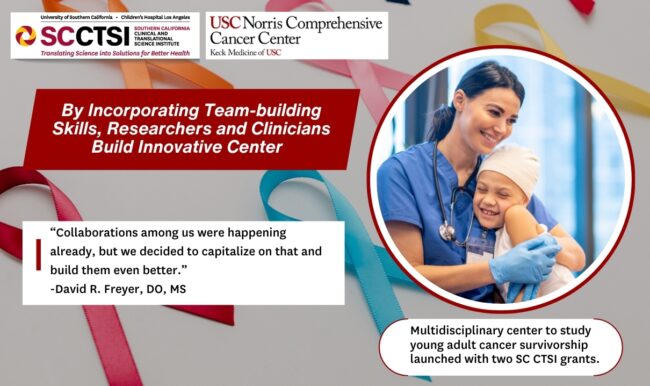By incorporating team-building skills, researchers and clinicians build innovative cancer center
Multidisciplinary center to study young adult cancer survivorship launched with two SC CTSI grants.
Surviving cancer treatment can be devastating at any age, especially for adolescents and young adults, categorized by people who are 15 to 39 years old. Young people are vulnerable to long-term, disruptive impacts from arduous treatment that affect every part of their experience: physical, social, educational, professional and financial.
Many of these young adults are newly launched into independence.
“Cancer treatment can interrupt their schooling or vocations at a critical time,” said Kimberly Miller, PhD, MPH, Clinical Assistant Professor in the Department of Preventive Medicine and Dermatology at the Keck School of Medicine of the University of Southern California. “They are frequently underinsured or uninsured. They may lack financial assets, and they may be unpartnered or lack other kinds of support.”

In 2019, Miller and two USC colleagues—David R. Freyer, DO, MS, and Joel Milam, PhD—established the Southern California Center for Young Adult Cancer Survivorship Research in the Keck School of Medicine. Freyer is a Professor of Clinical Pediatrics and Medicine at the Keck School of Medicine and Director of the cancer survivorship programs at both Children's Hospital Los Angeles and USC Norris Comprehensive Cancer Center. Although at the time of the creation of the Center, he was at USC, Milam is now a Professor of Epidemiology and Biostatistics and co-leader of the Cancer Control Prevention program at the University of California, Irvine.
The center features an interdisciplinary collaboration of affiliated clinical and research faculty, staff, trainees and patient advocates at USC and UCI. Its researchers address population health, health services and systems, well-being, quality of life and medical outcomes among young cancer survivors.
For years, the co-founders had a shared research interest in the health and welfare of young adult cancer survivors. With a team-building grant from the Southern California Clinical and Translational Science Institute (SC CTSI), they further focused their research ideas and aimed for more organized cooperation. Team-building grants do not fund pilot research projects. Instead, they support activities that enable new multidisciplinary or multisector science teams to share ideas and begin to build successful research collaborations.
“Collaborations among us were happening already, but we decided to capitalize on that and build them even better,” Freyer added.
With SC CTSI support, the co-founders organized a facilitated workshop with about 20 invited clinical and research colleagues. The workshop group was broken into four domains of knowledge with in-depth discussion about specific research ideas.
“We brought people together to encourage their interest in young adult cancer survivorship as it pertains to their scientific expertise,” Freyer said. “We may have different orientations as researchers, but we can bring those orientations together and cohesively work toward a shared goal.”
The co-founders then received a second team-building grant from SC CTSI to formalize a structure for the center.
“The second award allowed us to consolidate the center’s identity and create a presence with a website,” Freyer explained. “We compiled email lists, coordinated our communications and hired a part-time administrator. It was also important to develop a lecture series, inviting experts from a national pool to give presentations. The team-building grants were crucial for the center’s credibility and identity.”
“Team science is essential for tackling many of the complex health challenges we face today. It often requires multidisciplinary scientists, external partners, and patient representatives to effectively communicate and collaborate to address complex research questions together. Our team building grants and team science trainings are designed to help these new research groups come together, and build their capacity to do successful team science,” said Kayla de la Haye, PhD, Co-Director of the SC CTSI’s Research Development core.
The center is training the next generation of researchers focused on young adult cancer survivorship.
“Doing science today means working within a team and not just a team of scientists, but also including your staff and trainees,” Miller said. “It’s important to know how to form teams, communicate within teams, and receive formal training.”
The benefits of these grants reach beyond the confines of USC.
“Thanks to SC CTSI and this small funding, we are now a multi-site center in two states with trainees that range from undergrads to doctoral and postdoctoral, and medical students, residents and fellows,” said Miller.
The center has allowed affiliated researchers to link and leverage clinical and academic resources and raise their profiles to secure grants and collaborations.
“Grant reviewers mention that a strength of our applications is that we have this center,” Freyer said. “That our center was initiated with funding from SC CTSI gives us more credibility. It’s a badge of honor.”



